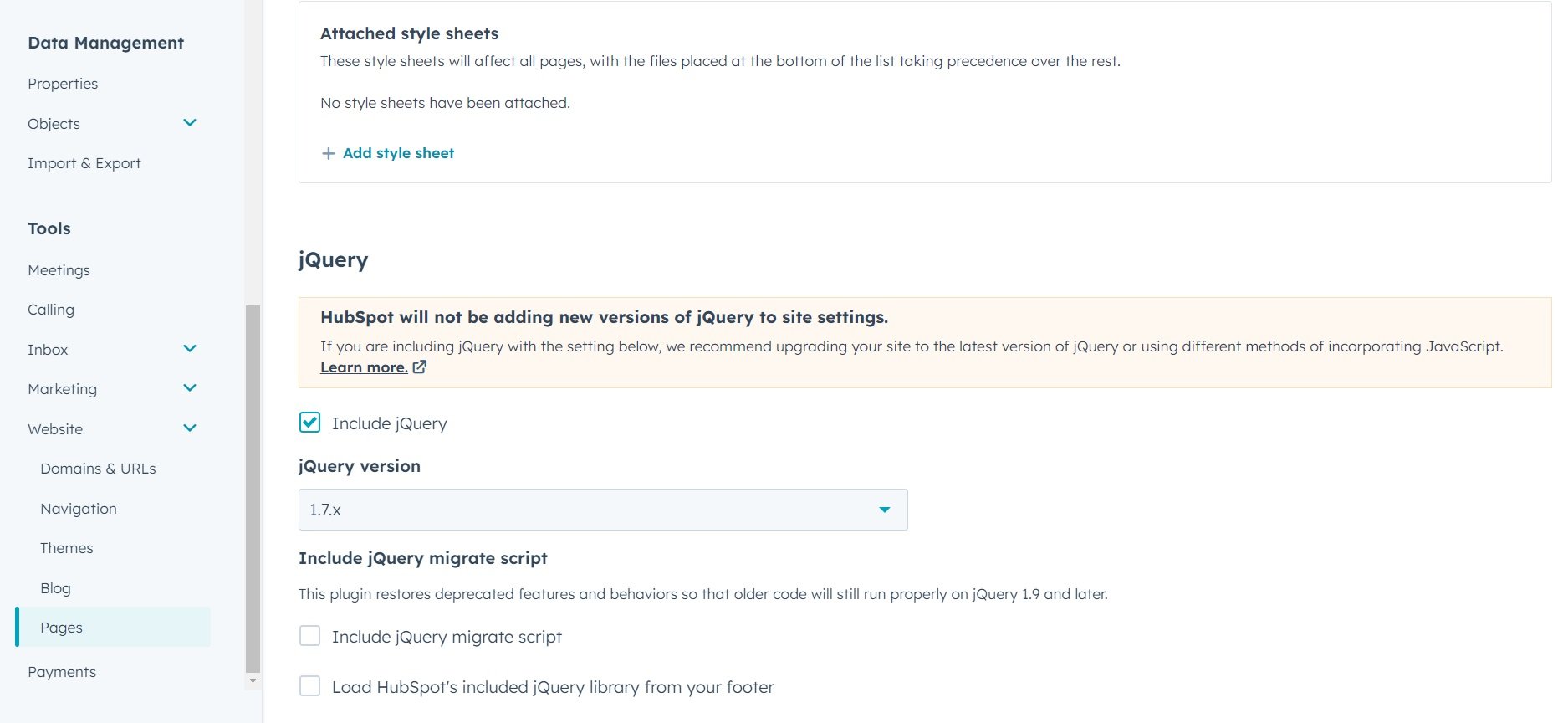Is jQuery really dead in 2023?
I was surprised when fond that HubSpot have jQuery library on board, because since I started my career in web development, 13 years ago, I heard phrase "this is the end of jQuery" at least once per annum. And, for sure, another library/framework/whatever is the "jQuery killer". So let's find out why HubSpot still uses it and is jQuery really dead in 2023?
What is jQuery?
Let's start with the question - what is jQuery? In fact jQuery is just JavaScript library. It has been used by developers for over a decade. jQuery has been one of the most popular JavaScript libraries since its release in 2006. jQuery is a fast and concise JavaScript library that simplifies HTML document traversing, event handling, and animating. It has been a go-to solution for developers who want to simplify the process of DOM manipulation and event handling. It was developed to make web development easier and faster, by providing a simple and concise API to manipulate HTML documents. jQuery became popular in the early days of web development due to its ease of use and cross-browser compatibility. It allowed developers to write less code and achieve more, making it a go-to library for many web developers.
However, as web development evolved and modern JavaScript frameworks emerged, jQuery started to lose its relevance. Frameworks like React, Vue, and Angular have gained popularity due to their superior performance, ease of use, and scalability. They also offer advanced features such as component-based architecture, server-side rendering, and state management, which are not available in jQuery (mostly because it is just the library, that never was something more than that).
In addition, modern browsers have improved significantly in recent years, making it easier to develop web applications without relying on jQuery. Browsers now offer built-in APIs and features that were previously only available through jQuery. For example, the querySelectorAll() method combined with any cycle (for example forEach) allows developers to easily select DOM elements without using jQuery. Browsers also offer native support for handling events, making jQuery's event handling less relevant.
Another reason why jQuery's relevance is decreasing is that it's not as actively maintained. The last major release of jQuery was version 3.6.0 in 2021, and since then, there have only been a few minor updates. This lack of updates means that jQuery may not be compatible with the latest web technologies and can be vulnerable to security issues.
Whether jQuery is still relevant in 2023?
Ok, let's back in 2023 and try to answer the simple question: is jQuery still relevant in 2023? And answer is, surprisely, rather yes than no. 77.7% sites around the world, where js was detected uses the jQuery. In other words 3 from 4 sites still have this library on the pages. You can check this info. The numbers in popular lookup tools like Siteefy & Builtwith shows bit different, but still impressive stats. First tell that we have something like 200 millions of active pages, BuilWith reports around 90 millions of pages with jQuery. It is not 3 from 4 but still 1 from 2.
For sure, jQuery is no longer the go-to library for web development, but as we see it still has a place in the web development ecosystem. Many websites and web applications still rely on jQuery, and it is still widely used in legacy codebases. It is also an excellent choice for small projects and prototypes, where the overhead of using a modern framework is not necessary.
Furthermore, jQuery still offers some advantages over modern frameworks. Its small size makes it an ideal choice for websites that require fast loading times. jQuery's simplicity and ease of use also make it a great choice for beginners who are just starting with web development. In fact, some developers prefer to use jQuery for its simplicity and ease of use, especially when it comes to handling events and animations. So to be honest, looks like jQuery now is some kind of guilty pleasure in front-end - almost everybody uses it, but nobody want to talk about it.
jQuery and HubSpot
As I mentioned - HubSpot have jQuery on board, so you can add it to all the pages on your HubSpot website in the Settings > Website > Pages:

But, you can't choose the latest version. HubSpot allows you to choose between only 2 versions:
- 1.7.x
- 1.11.x
And the lates version can be added to the pages only manually. Why is it happening like this? On the HubSpot for Developers page you can find next:
Modern JavaScript and web browsers have made writing JavaScript much easier. Most of the functionality of jQuery, has vanilla JavaScript equivalents. Those equivalents run faster, they don't require a large JavaScript library like jQuery. The result is they're also more secure.
So in fact HubSpot have the jQuery on board, but yes, rather like the legacy for old pages than some useful tool for further development and the developers team not recommend to use jQuery at all.
More, HubSpot have the tool, that can show how website colud preform & looks like without jQuery. You just need to add the next params to the page url:
?hsNoJQuery=true&hsDebug=true
So, for example for our page it will be https://www.growinternational.eu/?hsNoJQuery=true&hsDebug=true and even without jQuery it still looks nice.
But, despite HubSpot reommendation not to use jQuery at all, we need to understand that the number of the pages with jQuery in HubSpot is still quite huge to fully remove the library from the platform (currently BuiltWith reports that there are almost 530 000 live pages on the HubSpot).
Is jQuery really dead in 2023?
Instead of conclusion - let's answer to the quesion in the post title. jQuery is not completely dead in 2023 & not even close to. Despite decreasing relevance, huge number of "jQuery killers" & "not modern" label 3 from 4 sites (or 1 from 2, depens on what stat souce you like more) still use it.
And, in the end, just to compare some of the "killers" stats:
- React have almost 12 millions live pages
- Angular almost 3 millions live pages (the number is decreasing)
- Vue 1.5 millions
So, the only question is how long jQuery will live and how many of its "killers" it will outlive.




